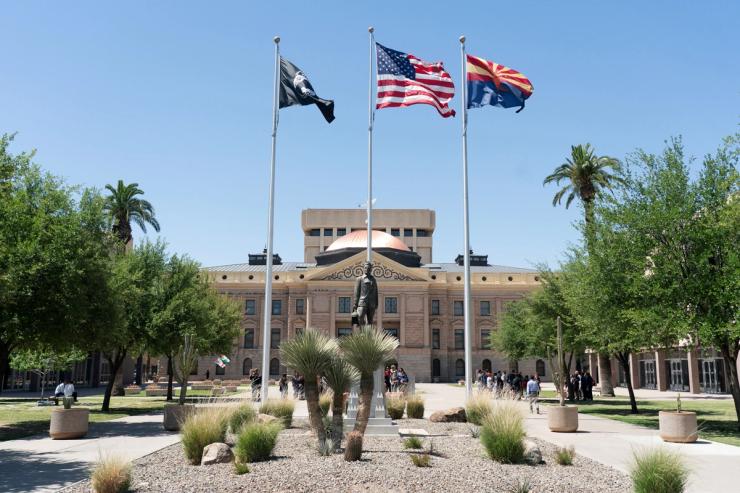The News
Arizona’s Supreme Court on Tuesday upheld an 1864 law banning all abortions except those necessary to save the mother’s life, making the key swing state among the most restrictive in the nation on abortion.
The 160-year-old law bans abortion from the moment of conception, carries a prison sentence of two to five years for providers, and does not include exceptions for rape or incest. The court found that although Arizona in 2022 banned abortion after the 15th week of pregnancy, the Civil-War-era law was never taken off the books, making it enforceable after Roe v. Wade was overturned.
Democrats immediately condemned the ruling, with President Joe Biden calling it “cruel,” while several Republicans also criticized the decision, calling for the state legislature to repeal the law.
Arizona is a key electoral battleground, and the fight over abortion rights there could have significant repercussions for the presidential election in November.
Arizona’s highest court, which decided the case by a 4-2 vote, temporarily placed its ruling on hold as lower courts debated the law’s constitutionality. Abortion providers in the state expect to continue performing the procedure at least until late May as the legal process continues.
SIGNALS
Arizona ruling could set stage for Comstock Act revival
Advocates for abortion access warn that the Arizona court’s ruling could breathe life into an anti-obscenity law from the 1800s, the Comstock Act. Much of the law, including parts that banned contraceptives and pornography, were nixed over the years, but its language banning abortion still stands. Roe nullified that piece of the law, but post-Roe, anti-abortion activists argue, there’s nothing stopping its enforcement.
Arizona’s decision “should serve as a warning for the rest of the country, in light of ongoing efforts to revive the Comstock Act,” Slate wrote. “In the hands of a far-right court, a dead, openly misogynistic, wildly unpopular abortion ban can spring back to life with a vengeance.”
This is Trump’s fault, Democrats say
Democrats were quick to remind the public that former president Donald Trump’s installation of three conservative justices to the U.S. Supreme Court allowed for the overturning of Roe, which in turn allowed for this ruling in Arizona. Arizona Sen. Mark Kelly put it bluntly: “Make no mistake, this is happening because of Donald Trump,” he posted on X.
Pro-abortion-access campaigners said Tuesday’s ruling — which came a day after Trump said abortion laws should be decided by states — is a reminder of the threat to abortion nationwide if Republicans win in November. The president and CEO of Reproductive Freedom for All said voting for Biden was necessary to “lock the federal right to abortion into law and undo these dangerous bans.”
Even some Republicans say ruling went too far
Former Arizona Gov. Doug Ducey, a Republican who signed a 15-week abortion ban into law in 2022, said the ruling was “not the outcome [he] would have preferred.” He asked lawmakers to “heed the will of the people and address this issue with a policy that is workable and reflective of our electorate,” seemingly referencing the majority public support for abortion access. As of 2023, most Republicans supported allowing an abortion at any time during pregnancy in cases of rape or incest.
Republican U.S. Senate candidate Kari Lake reversed her view on reviving the 1864 law after supporting it two years ago. On Tuesday, Lake said: “it is abundantly clear that the pre-statehood law is out of step with Arizonans.”



